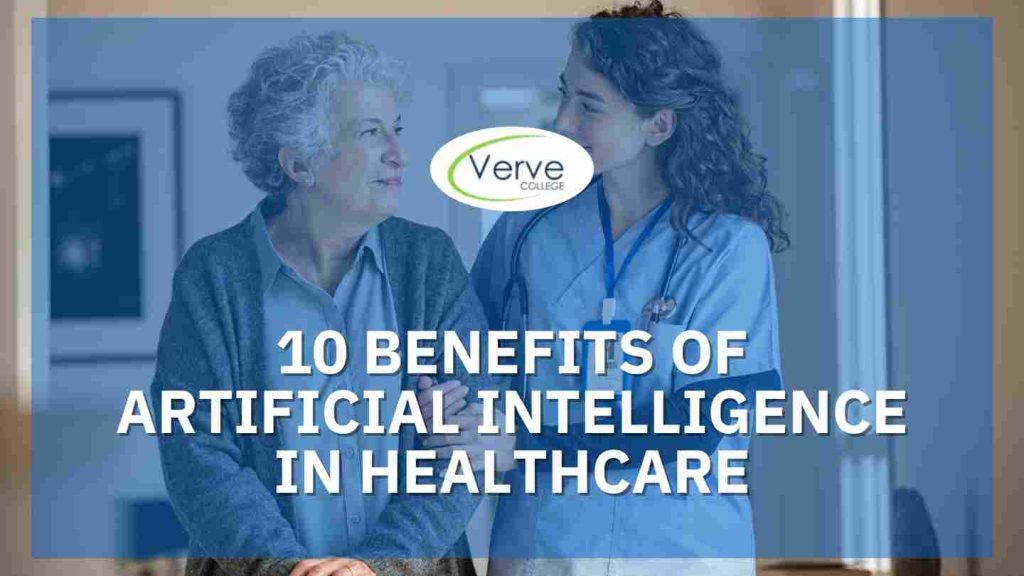10 Benefits of Artificial Intelligence in Healthcare
Artificial Intelligence (AI) is revolutionizing the healthcare industry, offering numerous benefits that improve patient care, enhance diagnostics, and streamline administrative tasks. In this article, we will explore the top 10 advantages of using AI in healthcare.
Enhanced Diagnostics
AI algorithms can analyze vast amounts of patient data, including medical records, lab results, and imaging scans. By leveraging machine learning techniques, AI can identify patterns and anomalies that may go unnoticed by human experts. This leads to more accurate and early diagnoses, enabling timely intervention and treatment.
Personalized Treatment Plans
Through AI-powered predictive analytics, healthcare providers can develop personalized treatment plans for patients. By considering individual patient characteristics, medical history, and genetic information, AI algorithms can suggest the most effective treatment options, improving outcomes and reducing the risk of adverse reactions.
Efficient Administrative Processes
AI can automate administrative tasks, such as appointment scheduling, medical billing, and data entry. This not only reduces the burden on healthcare staff but also minimizes errors and improves overall efficiency. By freeing up time, healthcare professionals can focus more on patient care.
Drug Discovery and Development
AI accelerates the process of drug discovery and development by analyzing vast amounts of biomedical data. Machine learning algorithms can identify potential drug candidates, predict their efficacy, and optimize dosage regimens. This expedites the development of new treatments and therapies, benefiting patients worldwide.
Precision Medicine
With AI, precision medicine becomes a reality. By combining patient-specific data, genetic information, and AI algorithms, healthcare providers can tailor treatments to individual patients. This approach maximizes treatment effectiveness while minimizing side effects, and imizing patient outcomes.
Remote Patient Monitoring
AI-enabled devices and wearables enable remote patient monitoring, allowing healthcare providers to track patient health in real time real technology can detect early warning signs, monitor chronic conditions, and alert healthcare professionals to potential emergencies. Remote patient monitoring improves patient safety and reduces hospital readmissions.
Predictive Analytics for Early Intervention
By analyzing patient data over time, AI algorithms can detect subtle changes and predict the likelihood of disease progression. This enables healthcare providers to intervene early, preventing complications and improving patient outcomes. Predictive analytics also help identify high-risk patients who may require additional monitoring or interventions.
Improved Workflow and Efficiency
AI can optimize workflow and streamline healthcare processes, leading to improved efficiency. For example, AI-powered chatbots can handle routine patient inquiries, freeing up staff to focus on more complex tasks. Additionally, AI algorithms can prioritize patient appointments based on urgency, reducing wait times and ensuring timely care.
Medical Image Analysis
AI algorithms excel in analyzing medical images, such as X-rays, CT scans, and MRIs. By quickly and accurately identifying abnormalities, AI assists radiologists in making more precise diagnoses. This not only speeds up the diagnostic process but also reduces the risk of human error.
Patient Data Security
AI plays a crucial role in safeguarding patient data. With advanced encryption algorithms and anomaly detection techniques, AI can identify and mitigate potential security breaches. By ensuring the privacy and integrity of patient information, AI promotes trust in healthcare systems.

Artificial Intelligence is transforming the healthcare industry by providing numerous benefits, including enhanced diagnostics, personalized treatment plans, streamlined administrative processes, and improved patient outcomes. By harnessing the power of AI, healthcare providers can deliver more efficient, precise, and patient-centric care.
Frequently Asked Questions about the Benefits of Artificial Intelligence in Healthcare
1. How does artificial intelligence improve healthcare?
Artificial intelligence in healthcare improves patient outcomes by enabling faster and more accurate diagnoses, personalized treatment plans, and efficient administrative tasks.
2. Can AI help in early disease detection?
Yes, AI algorithms can analyze vast amounts of medical data to identify patterns and detect diseases at an early stage, potentially saving lives through early intervention.
3. What are the benefits of AI in medical imaging?
AI in medical imaging can enhance the accuracy and efficiency of interpreting medical images, providing radiologists with valuable assistance in detecting abnormalities and making diagnoses.
4. How does AI assist in drug discovery?
AI algorithms can analyze large datasets to identify potential drug candidates, predict their efficacy, and accelerate the drug discovery process, leading to the development of new treatments.
5. Can AI improve patient monitoring?
Yes, AI-enabled devices and wearables can continuously monitor patients’ vital signs, detect anomalies, and alert healthcare providers in real-time proactive interventions and remote patient monitoring.
6. How does AI enhance precision medicine?
AI can analyze an individual’s genetic, lifestyle, and clinical data to provide personalized treatment plans, predict disease risks, and identify the most effective interventions for each patient.
7. What role does AI play in robotic surgeries?
AI enables robotic surgical systems to perform complex procedures with high precision and minimal invasiveness, improving surgical outcomes, reducing complications, and shortening recovery times.
8. Can AI improve healthcare access in remote areas?
Yes, AI-powered telemedicine platforms can bridge the gap in healthcare access by providing remote consultations, diagnosis, and treatment recommendations to patients in underserved or remote areas.
9. How does AI assist in healthcare data management?
AI can efficiently process and analyze large volumes of healthcare data, ensuring data accuracy, security, and interoperability, and enabling data-driven decision-making for improved patient care.
10. What are the ethical considerations of using AI in healthcare?
Ethical considerations in AI healthcare include ensuring patient privacy and data protection, addressing biases in algorithms, maintaining transparency in AI decision-making, and maintaining human oversight in critical healthcare decisions.




